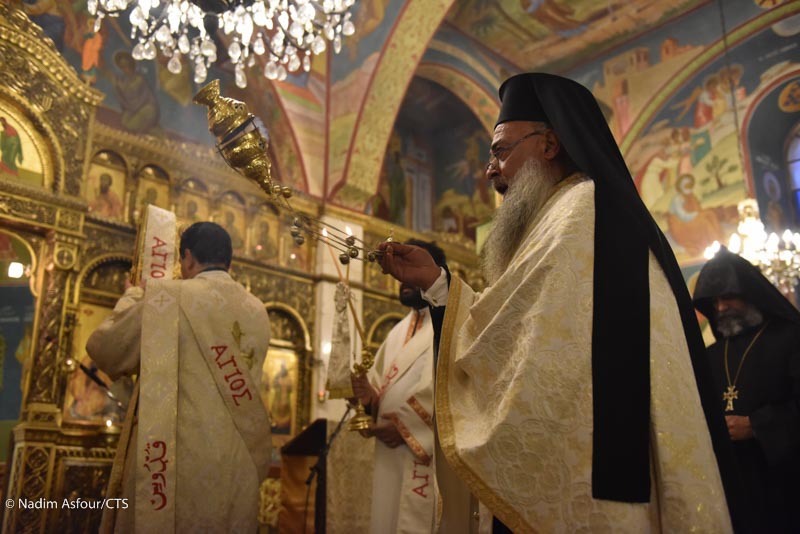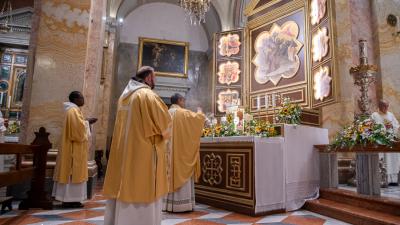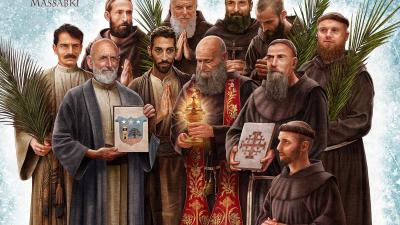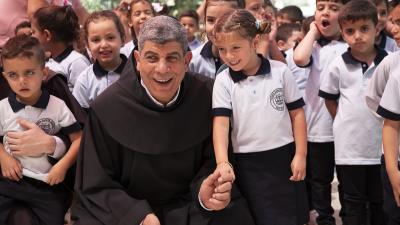
Padre Nostro, Abana, Our Father, Notre père, Vater Unser, Nuestro Padre. They expressed it in many languages, in different manners, with the palms of their hands towards the sky and with open arms. The Week of Prayer for Christian Unity in the churches of Jerusalem brought together faithful from all Christian denominations together, and each one in his or her own way, recited the Lord's Prayer. This was just one of the most significant moments of the celebrations that took place from January 21 to 29, a week after the official date, so as to allow Armenian Christians to celebrate Epiphany. “The love of Christ impels us toward reconciliation” (2 Cor 5.14 to 20), which was this year’s theme.
Many religious were present, including representatives from the various churches, but there was also great participation by the laity. Many places, people from different backgrounds, and one prayer to God: Christian unity. Knowing that the first step toward unity is sharing, for nine days, the churches of Jerusalem shared their dialogue with God, they read the Bible together, recited the Our Father together and the shared the sign of peace with each other. There was great emotion at the sign of peace between representatives of the Christian community, in the certainty that the true peace of Christ had come down on all of those who were present.
The week began on January 21 at the Holy Sepulcher with the Greek Orthodox, in the presence of Archbishop Theophanes, who explained the liturgy and rites that take place there. The next day, the Anglicans led the prayer and The Rev. Suheil Dawani gave the homily in the packed church of Saint George. With dim lights, and illuminated only by candlelight, the Armenians sang their songs on January 23 at the Cathedral of St. James. “Christian Unity does not mean sharing the same language, the same liturgy, because there is beauty in diversity,” said Fr. Martiros Cevian.
At the Lutheran Church of the Redeemer, everyone gathered next day for another moment of prayer. All of the representatives of the Christian community together with Protestant pastors, both men and women, who walked in a procession together. Bishop Munib Younan had very strong words, recalling the Pope's participation in the celebrations for the 500th anniversary of the Reformation: “Who could have imagined this? Because we see that the Holy Spirit is illogical and unpredictable, who knows what will happen in the future? Just because we cannot imagine having communion together right now does not mean that it will not happen.” On January 25, the Prayer for Christian Unity took place at Saint Savior’s Church, which belongs to the Custody of the Holy Land, where the parish priest, Fr. Al Nerwan Al-Banna, gave the homily. At the Holy Cenacle, on January 26, the Ecumenical Assembly was led by the Benedictine monks of the Dormition, along with theology students, and Fr. Elias Pfiffi spoke about Christian churches and unity. More prayers took place the next day in the Coptic Orthodox Church of Saint Anthony, where songs were sung by Copts and Syrians, and where The Rev. Fr. Antonios spoke.
The joy of the Ethiopian Christians on January 28 burst into song and dance, animated by the beat of drums. At the Ethiopian Church in Jerusalem, which is in a circular shape, so as to recall the shape of the Holy Sepulcher, the prayer for Christian unity took place in Amharic and Arabic, led by Archbishop Abune Enbakom. At the end of the week, at the Greek Catholic church of the Annunciation, Archbishop Joseph-Jules Zere said, “This unity among us is a source of water that can quench the thirst of those who are thirsty for faith in the one and living God and for the salvation of Jesus in the gift of the Holy Spirit, so that Jesus' prayer to the Father of being one in Him may be fulfilled.”
At the conclusion of each prayer, a moment of communion was also planned, with food and drink. This was a week in the name of brotherhood. As if the apostles (Peter, Bartholomew, Andrew, James, Matthew, etc.) after so many years, after traveling around the world, were to come back together in Jerusalem, where they walked, prayed and ate together before leaving. For nine days, they re-embraced all of the disciples of their Master, and each one exchanged in his or her own language, a smile, a handshake, a piece of bread and a glass of wine, a cookie and a cup of coffee, in short, a gesture of peace.
Beatrice Guarrera
►►►Related Articles
- Christmas greetings to the Orthodox churches
- Week of Christian unity in Jerusalem: “proclaiming the joy of His resurrection”
- Living water to quench our thirst of unity




